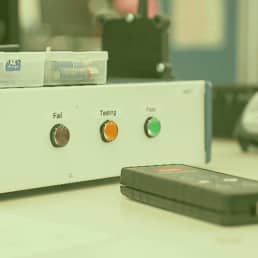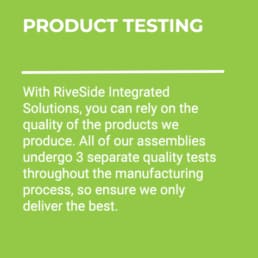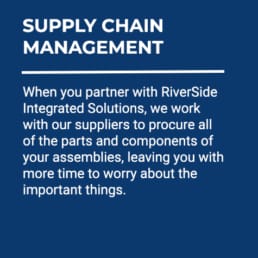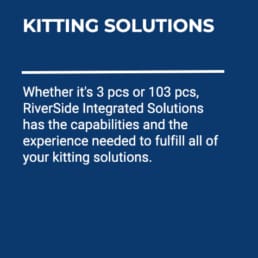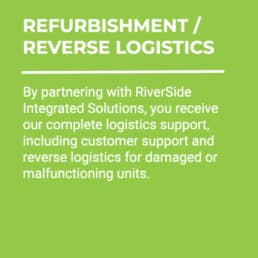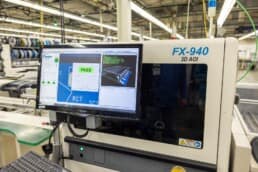Best Practices in Quality Control
There are many factors that original equipment manufacturers (OEMs) should consider when selecting a manufacturing partner. Quality is at the top of the list.
A supplier’s quality control program is more than just meeting the requisite ISO standards and requirements. It represents their proven way of ensuring consistent, high-quality products.
When assessing a potential partner’s quality control, there are three questions OEMs should ask to begin:
- What certifications and standards does the manufacturer have? For example, RiverSide Integrated Solutions (RIS) is ISO 9001 certified and employs IPC-A-610 artistry standards.
- Does the manufacturer utilize the latest quality control software and machine technologies?
- What is the supplier’s quality track record and the typical level of rework due to quality issues?
It takes a team of quality specialists to ensure that every product meets the requisite standards and specifications. And for them to do their job properly, they need the right tools and technologies. Quality control and assurance are not just a part of production but are integrated into the entire manufacturing process. From design until the product reaches the customer.
OEMs should seek quality management partners to manage and oversee quality control. With an integrated partner like RIS, they can do so in all areas of the supply chain.
IMPLEMENTING EFFECTIVE QUALITY CONTROL STRATEGIES
The specifics of quality control programs may vary from industry to industry. Still, some general concepts apply to nearly every manufacturing process. Below are some key best practices in quality control.
LEVERAGE AUTOMATION
One crucial best practice in quality control is leveraging the power of automation on the factory floor. Industrial automation uses control systems and equipment, such as computer software and robots, to perform tasks historically done manually.
The technologies used in industrial automation have advanced significantly in recent years. This is due to the digitalization of manufacturing. It has opened up more opportunities for companies to use automation solutions.
Industrial automation has many benefits, such as improved quality, higher efficiency and throughput and lower costs.
The precision provided by industrial automation results in higher consistency and reproducibility along the manufacturing process. Ultimately, this provides higher-quality products.
PERFORM THOROUGH INSPECTIONS
Unsurprisingly, inspections are integral to quality control and a top best practice for manufacturers.
Quality inspections consist of checking, measuring and testing products at predetermined checkpoints along the manufacturing process. In comparing the results against specific requirements to ensure compliance, inspectors can rate the quality level of a product.
Frequent and routine quality inspections allow off-spec and defective products to be identified earlier during manufacturing. This helps improve operations efficiency and reduce costs.
Over time, OEMs can use the data collected during quality inspections to develop trends. This way, they can detect areas of the supply chain with ongoing quality issues.
ESTABLISH ROBUST TRACKING
Tracking, or traceability, is a significant aspect of quality control. A robust tracking program is a critical best practice for manufacturers. OEMs and manufacturers must be able to track materials and products from raw material acquisition through manufacturing. Tracking is typically only complete once the final product reaches the customer.
Understanding product flow through the supply chain is invaluable for manufacturers. It provides a wide array of insights regarding quality control and process inefficiencies. It also provides troubleshooting opportunities when problems arise.
RIS’ COMMITMENT TO QUALITY CONTROL
RIS is dedicated to providing advanced quality contract manufacturing services.
The backbone of this effort is our quality management system. This helps us ensure excellence in our printed circuit board, assemblies, supply chain management and distribution services.
Our quality management system’s primary goal is to improve the effectiveness of our processes and services continually. We do so while continuing to comply with industry standards and meeting customer needs with every project.
We are ISO-9001 registered by each of our entities and adhere to quality systems that meet national standards.
Our quality management systems and processes include the following:
- IPC-A-610 quality standards
- American Society for Quality (ASQ)
- Safety Agency (UL, CSA, TUV, ETL)
- Quality Management Software
- Defects per Million Opportunities (DPMO)
- First pass yield and Pareto of defects at inspection and test gates
- Regular review of process quality and RMA data with customers
- Route control of serialized assemblies at inspection and test
As your one-stop shop, we have the capabilities, capacity, quality assurance standards and resources to support all your needs. We understand that supply chain management is complicated and time-consuming. That’s why we urge our customers to utilize our integrated solutions fully.
About RiverSide Integrated Solutions
RIS is an advanced contract manufacturer providing robust solutions in circuit board assembly and product assembly. We employ more than 350 people and provide services to OEMs worldwide. We operate two state-of-the-art manufacturing facilities within the US.
With all of the choices in contract manufacturers out there, we know it can be challenging to find someone who understands your business model and has your best intentions in mind. RIS has always proven to be a win-win-focused relationship.
As your one-stop shop, we have the capabilities, capacity, quality assurance standards and resources to support all of your manufacturing needs. We understand that supply chain management is complex and very time-consuming, so we urge our customers to utilize us in the fullest capacity.
Our total-package solutions include:
- Extensive supply-chain network
- Full box-build assembly
- Dedicated Program Team
- Warehousing, kitting and drop-shipping capabilities
- Reverse logistics
- Flexible order fulfillment
- Scalability to meet your needs
Contact us today at (507) 523-3220 to see how we can help with your manufacturing project, or click contact us for a quote.



